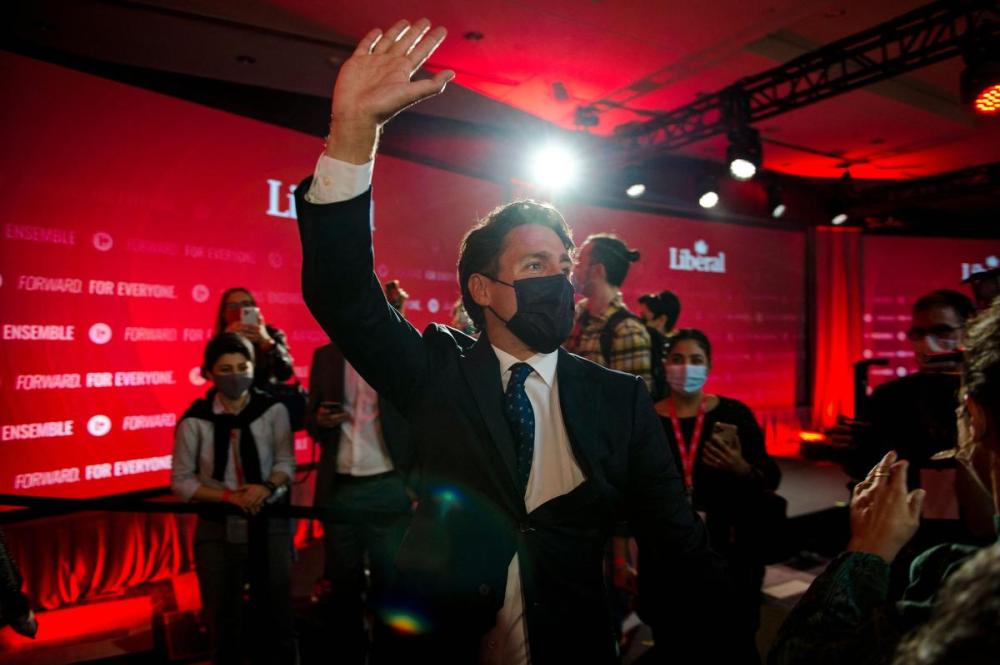Most Canadians voted for the status quo. What does this mean for the opposition?
Advertisement
Read this article for free:
or
Already have an account? Log in here »
To continue reading, please subscribe:
Monthly Digital Subscription
$0 for the first 4 weeks*
- Enjoy unlimited reading on winnipegfreepress.com
- Read the E-Edition, our digital replica newspaper
- Access News Break, our award-winning app
- Play interactive puzzles
*No charge for 4 weeks then price increases to the regular rate of $19.95 plus GST every four weeks. Offer available to new and qualified returning subscribers only. Cancel any time.
Monthly Digital Subscription
$4.99/week*
- Enjoy unlimited reading on winnipegfreepress.com
- Read the E-Edition, our digital replica newspaper
- Access News Break, our award-winning app
- Play interactive puzzles
*Billed as $19.95 plus GST every four weeks. Cancel any time.
To continue reading, please subscribe:
Add Free Press access to your Brandon Sun subscription for only an additional
$1 for the first 4 weeks*
*Your next subscription payment will increase by $1.00 and you will be charged $16.99 plus GST for four weeks. After four weeks, your payment will increase to $23.99 plus GST every four weeks.
Read unlimited articles for free today:
or
Already have an account? Log in here »
Hey there, time traveller!
This article was published 23/09/2021 (1567 days ago), so information in it may no longer be current.
It was an eerie election. Voters not only elected another minority government. Most voted for no change at all.
Those in Ontario’s 905 region stayed by and large with the Liberals. A big chunk of Quebecers remained with the Bloc Québécois. Atlantic Canada continued to favour the Liberals. British Columbia remained fractured, with the Liberals, New Democrats, Greens and Conservatives all winning seats.
Indeed, the only real upset was the Green victory in Kitchener Centre, the federal party’s first success in Ontario.

In part, these results support the argument that this was an unnecessary election.
But more importantly, they suggest why it was unnecessary: Canadians were for the most part happy with the Parliament they had elected in 2019. Given a chance to change it, they demurred.
This does not mean that voters will support Justin Trudeau’s minority Liberal government forever. But it does suggest that they will support it for the time being.
This puts constraints on the opposition parties. Minority governments give the opposition more power. But such governments also give them more responsibility to get things done.
Erin O’Toole’s Conservatives, for instance, will be expected to do more than attack Trudeau as a corrupt fraud. They will be counted on to help provide solutions to the real problems the government faces.
Jagmeet Singh’s NDP faces almost the reverse problem. It strove to help the minority Liberal government come up with practical solutions to the COVID pandemic. But politically, its helpful stance won it few rewards.
Indeed, the NDP was arguably one of this election’s real losers. In spite of Singh’s efforts, the party ended up winning just 25 seats — only one more than it had held at dissolution.
Its bold call to tax the rich largely fell on deaf ears. Ditto its blueprint for universal pharmacare.
In part, this reflected the occupational hazard faced by any party that supports a minority government. When things work out, the government takes credit. When they don’t, the opposition takes the blame
But it also underlined the difficulty of the NDP’s efforts to build support across the broad middle class. Tax reform aimed at penalizing the uber-rich may be popular in the abstract. It is less so when government gets down to the question of defining who constitutes this class.
Is someone with assets worth millions too wealthy? Should his or her holdings be subject to extra levies?
But what if those assets are agricultural? Should farmers be penalized? Or do they merit an exemption from capital taxes because they are deemed more virtuous than other investors?
The NDP will have to sort out all of this, as it contemplates its role in Canada’s latest iteration of minority government.
In some ways, the Liberals have the easiest task. The voters didn’t punish them for holding an unnecessary election. Rather, they rewarded them by giving them another chance.
The voters indicated that they support the Trudeau government’s attempt to run a sort-of activist government. They also indicated that they don’t expect miracles — but do expect peace, order and good government.
They told the Conservatives that while they are not naive about Trudeau, they are not willing to dismiss him.
They told the NDP to figure out what it stands for and try again.
Thomas Walkom is a Toronto-based freelance contributing columnist for the Star. Reach him via email: walkomtom@gmail.com


